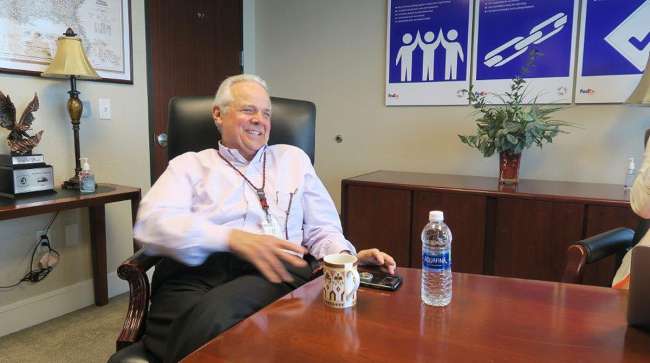Senior Reporter
Ducker Departs, but He’ll Be Remembered as a Force for FedEx

MEMPHIS, Tenn. — After 43 years, FedEx Freight CEO Michael Ducker finally has retired.
Sort of.
From all appearances, he will be winding down a bit. He’ll be taking charge of the sprinkler system at the family home (by order of his wife), play his piano for relaxation (his mother demanded a cultural pursuit in his youth), tinker with his tractor (he’s a farmer at heart) and tend to his beehive (“they’re amazing creatures”), he says.
But he’ll also still be working for FedEx as a consultant in spite of retiring earlier this month from commanding the company’s massive fleet of commercial vehicles from the fancy corporate offices here. And, he’ll be tending to special projects for Fred Smith, the founder and chairman of FedEx Corp. whom Ducker has admired since going to work for the company.
“He mentors, he develops, he trains,” Ducker said. “He teaches you while you’re working for him.”
Ducker, 65, said he tried to retire four years ago. But before he could begin packing boxes, Smith made him an offer he couldn’t refuse — the top post at FedEx Freight.

Ducker has served as chairman of the U.S. Chamber of Commerce and currently is chairman of its executive committee. (Andrew Harrer/Bloomberg News)
Ducker has been on a mission for FedEx most of his adult life, never abandoning the company’s founding principle of the Purple Promise: “I will make every FedEx experience outstanding.”
Ducker said what he regards as one of the most important duties is finding and developing talent.
“I tell people all the time I don’t have to be the smartest guy in the room, but I sure do want to hire the smartest and have them in our room here at FedEx,” Ducker said.
He also said he’s a big believer that a CEO needs to spend time out of the executive offices.
“This is a high-touch business,” Ducker said. "People want to see you, and they want to feel like what they’re doing is important. At the end of the day, this is a blue-collar business. I mean we’re moving stuff rapidly across the world.”
And doing it well. By every account, Ducker has left the Freight division in better condition than he found it.
FedEx Freight revenue increased 12% in fiscal year 2018 due to higher revenue per shipment and average daily shipments, and the company’s margins are steadily increasing due to an improved industrial business environment and a better balance of volume, pricing and capacity, according to the company’s annual report.
But perhaps his most significant mark on FedEx has been building the company’s footprint in Europe, the Middle East and Asia.
“His strategic instinct has been integral in building our company into a global powerhouse,” Smith said.
Those who have worked with Ducker, and for him, say he’s extremely smart, highly energetic, passionate but even-tempered, a top-notch talent developer and a consensus builder.
He’s also a nice guy, said Mike Glenn, who recently retired from FedEx as president of market development.
“I can say without reservation that Mike Ducker is one of the nicest human beings I’ve ever met in my life,” Glenn said. “He also has the utmost integrity, he’s an outstanding leader and exhibits courage in the face of adversity.”
Glenn added, “He’s as comfortable talking to the head of state for some country as he is talking to his old high school football teammates.” Ducker was an all-state offensive lineman and champion wrestler at Red Bank High School in Chattanooga, Tenn., and named “Mr. Red Bank High School” in 1971.
“Mike Ducker has had a profound impact on the ATA and on me, personally and professionally,” said Chris Spear, president of American Trucking Associations. “When others chose different paths, he led — without reservation. Mike has helped shape ATA’s winning attitude, reminding us all that if you’re not at the table, you’re on the menu.”
Satish Jindel, president of transportation research and advisory firm SJ Consulting Group, described Ducker as a “pure gentleman” who stays calm and gets things done, in particular essentially building FedEx’s international business from the ground up. “Which is much harder to do than domestic because of its challenges of time zones, currency fees and different competitive dynamics in every country,” Jindel said. “In the U.S., you’re competing with the Post Office, UPS and a few small regional players. Very predictable.”
Ducker has served as president of FedEx Express Asia Pacific in Hong Kong, and led the Southeast Asia and Middle East regions from Singapore, as well as southern Europe from Milan, Italy. “As a result of working at FedEx, I’ve gotten to meet kings, queens, presidents and prime ministers,” he said.
One of his favorite career memories stems from 1978, when the first Boeing 727 rolled onto the FedEx runway. That meant, for example, that the company could send one loaded plane rather than three smaller planes for shipments to New York City. One of his scariest moments came during 9/11, when all the aircraft were grounded for a few days.
The changes he has seen at FedEx over the years have been “extraordinary, remarkable, unprecedented,” Ducker said.
“We went from a very different approach, one without custodial control, without a lot of tracing, tracking, innovation, one where speed was not necessarily the order of the day. It was pretty manual at that point,” he said. “Now it’s highly automated. But in the old days, you had no package traceability or certainty of delivery.”
Ducker has served as U.S. co-chair of the US-Mexico CEO Dialogue, a collaborative effort created by the U.S. Chamber of Commerce and its Mexican counterpart to strengthen ties between those nations. He also served as chairman of the U.S. Chamber of Commerce and currently is chairman of its executive committee. The organization’s CEO, Tom Donohue, said that Ducker has been instrumental in the chamber’s quest to find ways to improve the efficiency for shipments going back and forth across the U.S.-Mexico border.

Ducker has left the Freight division in better condition than he found it. (John Sommers II for Transport Topics)
“He’s one of the best logistics guys in the country,” Donohue said. “He has dealt in a very significant way with labor issues all over the country, regulatory issues all over the world, and dealt with personnel issues in the organizations that he has held senior positions.”
Ducker is a member of The Salvation Army national advisory board of directors and executive committee.
Bill Burke, a retired insurance executive, served with Ducker on the national advisory board for the Salvation Army.
“Mike really has the heart of a servant as well as the heart of a leader,” said Burke, adding that Ducker is “super smart,” but at the same time has a kind of “aw, shucks” manner that puts people at ease.
“Mike has a phenomenal gift of motivating people, which is especially important because the freight business is very people-oriented,” said Doug Duncan, a former FedEx Freight CEO who has known Ducker since 1998.
Early on, Ducker wanted to be a doctor and was attending the University of Mississippi, known as “Ole Miss,” on a football scholarship, but he sustained a serious knee injury, underwent three surgeries and had to give back the scholarship. He began working at FedEx in 1975, sweeping floors and unloading aircraft to save money for his senior year when his boss told him going back to college was a waste of time. The supervisor offered him a management job. (He eventually finished his graduate work and was awarded a master’s degree in business administration from a joint program of the Kellogg School of Management at Northwestern University and the Hong Kong University of Science and Technology.)
Though life can be hectic and get out of balance at times, he said his priorities remain the same: “My faith, my family and FedEx — in that order, but I don’t exclude one for the other.” He and wife Cheryl have been married 23 years. Their 19-year-old daughter, Rachel, is a sophomore at Ole Miss.
“In my everyday life, I read the Bible. That’s an important part of my day,” he added. “That helps foundationally to set me up for the day.”
Ducker grew up in rural Signal Mountain, Tenn., about 7 miles outside Chattanooga. “I tell people I’m probably the only CEO you’ve had who has actually butchered hogs in the field in an iron kettle with a wood fire underneath.”
His dad ran a one-man garbage service but also hauled coal, gravel, wood, manure and did hayrides — all with the same truck. His mom put Ducker on the truck with his dad when he was only 2 years old. Ducker said he could shift truck gears without using a clutch by the time he was 10. He could barely reach the pedals, but he drove the truck during the hayrides when he was 9.
“I guess I was destined to be a trucker from the early days,” Ducker said.


